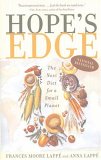Summary | Excerpt | Reviews | Readalikes | Genres & Themes | Author Bio

Critics' Opinion:
Readers' Opinion:
First Published:
Jan 2002, 400 pages
Paperback:
Apr 2003, 400 pages
So, we've turned cattle into virtual protein disposals, and now we're doing the same with fish. During World War II, a government-issued poster read EAT FISH, THEY FEED THEMSELVES. But this is less and less true; we're now feeding fish to fish, shrinking overall supply. To get one pound of salmon, we use four pounds of what are deemed "junk" fish, including sardines, that are a vital protein source for a billion poor people-exactly those who could never afford the higher-priced salmon.21
Neither do we register the literal waste created by our production drive-or that drive's environmental cost. Livestock waste in the U.S.-now 130 times more than waste produced by humans-is polluting water and killing fish. Waste from the growing livestock population now contributes 16 percent of global emissions of methane, a greenhouse gas 25 times more potent than carbon dioxide.
A squinted-eye fixation on production blinds us to other ways in which we're destroying the very soil, water, and biotic life we must safeguard if we are to thrive. We are ruining topsoil many times faster than it is being created, as noted earlier. Fresh water consumption, much of it for agriculture, is almost two times that of its annual replacement. And 70 percent of the world's marine species are at risk of extinction.
And then there's our health. Production myopia has spurred the shift to giant feedlots with thousands of head of cattle raised in cramped spaces. With cattle confined in such close quarters, cattlemen are rightfully worried; they know that one sick cow could bring the whole herd down. Fearing disease and feeling the pressure of production-to get animals primed for slaughter as fast as possible-cattlemen turn to antibiotics to speed the cows' weight gain and stave off bovine illness. Today it's common practice to add antibiotics to feed-not just for the sick, but for all cattle. In fact, a recent study of antibiotics found that almost three quarters of antibiotics used in the U.S.-for all purposes-are now going to livestock. Alarmed that this practice is transferring dangerous antibiotic resistance to us humans, even the American Medical Association has called on livestock producers to stop.
Locked in the thought trap-the single-minded focus on ever greater production-we ironically cannot even see how we're reducing potential supply, destroying the basis of future security, and endangering our health.
Thought Trap Two: Thank our selfish genes. Linked to this fixation is the assumption that the only way to keep the machinery of production in highest gear is to rely on our innate selfishness. Not unlike our myopic focus on production, our vision of ourselves has become so narrow that all we can see is our basest survival drive.
A recent stroll through my local bookstore illustrated how widespread the view is that we humans are nothing but selfish egoists. The titles popped out at me: Mean Genes, The Selfish Gene, and even one entitled How to Be Your Own Selfish Pig. Chart-topping shows like Who Wants to Be a Millionaire? reinforce the notion that our selfishness inevitably manifests as material greed, that we're all money-lusting. The dramatic conclusion of the hit TV show Survivor seemed to clinch the case: In this material world, it's the most manipulative and cutthroat among us who wins.
A few months ago the New York Times business section carried a story about a multimillionaire. Aware of the Internet billionaires barely out of braces, the guy asks: "What have I done wrong?" Now, this distraught multimillionaire isn't portrayed as pathetic and in need of immediate psychiatric help. No, the story tells us that here is a normal guy with a normal reaction. This is just who we are; we always want more.
The sad thing is, we've come to believe this caricature of ourselves, convinced that without these traits we'd lack the entrepreneurial heat that propelled us from cave to computer.





The House on Biscayne Bay
by Chanel Cleeton
As death stalks a gothic mansion in Miami, the lives of two women intertwine as the past and present collide.

The Flower Sisters
by Michelle Collins Anderson
From the new Fannie Flagg of the Ozarks, a richly-woven story of family, forgiveness, and reinvention.

The Funeral Cryer by Wenyan Lu
Debut novelist Wenyan Lu brings us this witty yet profound story about one woman's midlife reawakening in contemporary rural China.
Your guide toexceptional books
BookBrowse seeks out and recommends the best in contemporary fiction and nonfiction—books that not only engage and entertain but also deepen our understanding of ourselves and the world around us.